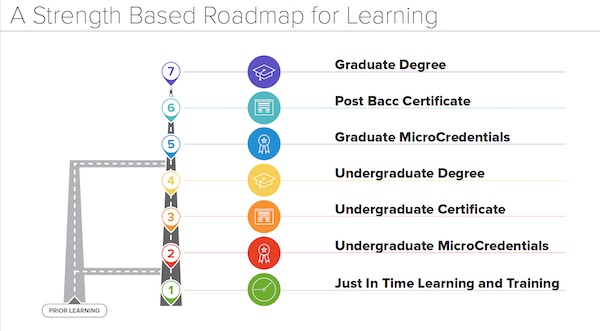Published on
MicroCredentials, Workforce Preparation, and the Public University Imperative

There are certain words that we, in large public institutions, sometimes find controversial. These are considered to be somewhat anathema to higher education and its historic goals of crafting the next generation of well-informed citizens capable of participating in a functioning democracy.
You may recognize some of these words:
- Employer needs
- Workforce preparation
- Market analysis
- Customer service
There are even some new words that appear threatening:
- Microcredentials
- Short courses
- Competency-based education
I’m here with a not-so-bold proclamation. These are not dirty words. They are essential words for the public university to fulfill both its historic and contemporary mission. And we in the academy should become familiar with them and embrace them.
This proposition is more difficult than it seems. The modality in which a university or college engages students goes to the core of the institution’s identity. This transformation can be culturally contentious; meanwhile the world marches on. Students’ needs and expectations are changing because the world is changing, and our institutions need to change lest we fail to meet the challenge of our mission.
There are other words that are truly diametrically opposed to our purpose in higher education. They are the actual enemy of public universities fulfilling their mission:
- Some college, no degree
- Student debt
- Fifth year
- ACT/SAT scores
- Students as “college material”
So, let’s get (not so) controversial. Let’s talk about how workforce-applicable degrees can graduate students who can be good citizens. Let’s talk about how micro-credentials can support family-sustaining wages. Let’s talk about how customer service can improve graduation rates and reduce student debt.
Let’s look at an example of a fully online program doing just that at Louisiana State University.
The Construction Management Department at LSU was an early adopter of online degrees. They created both an MS in Construction Management and a post-baccalaureate certificate that aligns into the masters degree.
This fall LSU Online is supporting the launch of their online bachelor of science in construction management (one of our two initial online undergraduate degrees). Building to that online undergraduate degree is the first in a series of online undergraduate micro-credentials in specific, targeted topics on construction management. These MicroCreds® are offered short-form as non-credit, and longer for college credit.
As Charles Berryman, chair of the Bert S. Turner Department of Construction Management, described them: “MicroCred has been organized for those with or without a college degree who would like to see an overview of the profession along with an understanding of construction materials and methods and how these relate to reading a set of construction drawings. It’s a great start option for individuals who may not be ready to pursue a full baccalaureate degree.”
The shorter, targeted MicroCreds don’t require a student to go through a formal admissions process to LSU; they are offered through our Continuing Education department. Students can apply those courses and credits directly to their undergraduate degree. This increases access as well as providing workforce-relevant skills that students can use right away in their jobs.
The program is also leveraging credentials that working professionals (and military service members) already have in order to acknowledge prior skills and knowledge and help students avoid wasting time and money on their way to their degree. Students coming into the program with these other credentials receive credits through Prior Learning Assessment to accelerate degree completion or to complement a degree they already have.
While we are proud to support this innovative department in this fully stackable universe, it is also important to note that this is the only fully stackable program that the university offers. While many of our institutions are moving toward this type of “micro to macro” vision, it is easy to talk about and very hard to implement.
Policies stand in the way (those can be changed); the pace of academic governance slows down new, relevant programs (that can be changed); and the cultural identity of an institution can inhibit this evolution (that can be transformed). All of those elements are very difficult to change, and each are contextualized differently in colleges and universities.
We are being challenged by our students to step out of our historical comfort zone. As baby boomers retire and millennials dominate the workplace, if we fail to evolve to meet our public university mission, our degrees may lose relevance.
If we fail to innovate to meet our students’ needs, we fail our mission. We at LSU are choosing innovation over failure, meeting our bold mission for the 21st century.
Author Perspective: Administrator



